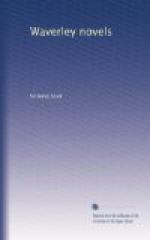After indulging the prisoner, for such our hero must now be considered, with what he thought a reasonable time for reflection, Major Melville resumed his examination, premising that, as Mr. Waverley seemed to object to general questions, his interrogatories should be as specific as his information permitted. He then proceeded in his investigation, dictating, as he went on, the import of the questions and answers to the amanuensis, by whom it was written down.
’Did Mr. Waverley know one Humphry Houghton, a non-commissioned officer in Gardiner’s dragoons?’
’Certainly; he was sergeant of my troop, and son of a tenant of my uncle.’
’Exactly—and had a considerable share of your confidence, and an influence among his comrades?’
’I had never occasion to repose confidence in a person of his description,’ answered Waverley. ’I favoured Sergeant Houghton as a clever, active young fellow, and I believe his fellow-soldiers respected him accordingly.’
‘But you used through this man,’ answered Major Melville, ’to communicate with such of your troop as were recruited upon Waverley-Honour?’
’Certainly; the poor fellows, finding themselves in a regiment chiefly composed of Scotch or Irish, looked up to me in any of their little distresses, and naturally made their countryman and sergeant their spokesman on such occasions.’
‘Sergeant Houghton’s influence,’ continued the Major, ’extended, then, particularly over those soldiers who followed you to the regiment from your uncle’s estate?’
‘Surely; but what is that to the present purpose?’
’To that I am just coming, and I beseech your candid reply. Have you, since leaving the regiment, held any correspondence, direct or indirect, with this Sergeant Houghton?’
’I!—I hold correspondence with a man of his rank and situation! How, or for what purpose?’
’That you are to explain. But did you not, for example, send to him for some books?’
‘You remind me of a trifling commission,’ said Waverley, ’which I gave Sergeant Houghton, because my servant could not read. I do recollect I bade him, by letter, select some books, of which I sent him a list, and send them to me at Tully-Veolan.’
‘And of what description were those books?’
’They related almost entirely to elegant literature; they were designed for a lady’s perusal.’
’Were there not, Mr. Waverley, treasonable tracts and pamphlets among them?’
’There were some political treatises, into which I hardly looked. They had been sent to me by the officiousness of a kind friend, whose heart is more to be esteemed than his prudence or political sagacity; they seemed to be dull compositions.’
‘That friend,’ continued the persevering inquirer, ’was a Mr. Pembroke, a nonjuring clergyman, the author of two treasonable works, of which the manuscripts were found among your baggage?’




